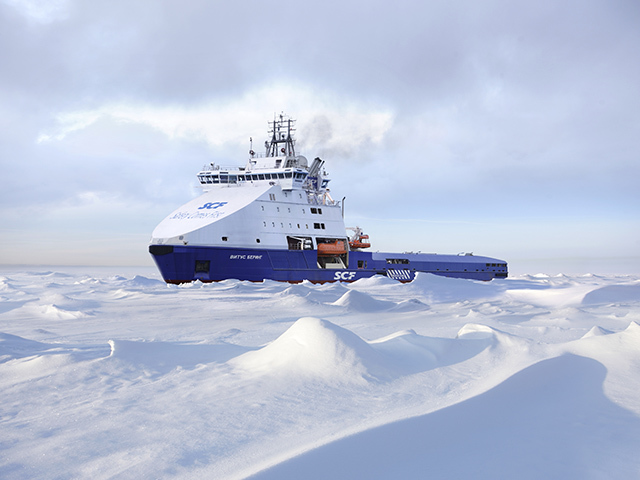
OAO Surgutneftegas plunged the most in four months, leading Russian stocks lower in U.S. trading as President Vladimir Putin rebuffed calls to end the war in Ukraine after the downing of an airliner, stoking concern that new sanctions could cripple the economy.
ADRs of Russia’s third-largest oil producer sank 7 percent in New York yesterday to the lowest since May 30. It was the worst performance on the Bloomberg Russia-US Equity Index, which dropped 3.4 percent to a two-month low.
The benchmark Micex index has tumbled 3.9 percent in Moscow since Malaysian Air’s flight MH17 went down on July 17 in an area of eastern Ukraine controlled by pro-Russian separatists, who have denied they shot it down. The crash killed all 298 people aboard. Stocks sank yesterday as Putin resisted growing calls from world leaders to end the war in the former Soviet republic.
“The risk of new sanctions on Russia is high,” Paul Zemsky, the New York-based head of multi-asset strategies at Voya Investment Management LLC, which oversees $213 billion, said by phone yesterday. “Political pressure on Russia will continue until we get satisfactory answer on what downed the plane.”
The U.S. last week imposed targeted sanctions on selected Russian banks, military, and energy companies including OAO Rosneft, Russia’s largest oil producer, after the European Union was unable to agree on more than limited additional sanctions. The U.S. and EU had previously imposed punitive measures including asset freezes and travel bans for Putin’s allies in Russia and Ukraine.
The international sanctions, intended to punish Russia for annexing the Black Sea peninsula of Crimea in March and for its role in supporting separatist rebels, have already damaged investor sentiment, said Walter “Bucky” Hellwig, who helps manage $17 billion at BB&T Wealth Management in Birmingham, Alabama.
“I wouldn’t make a big bet on the Russian market at this time,” Hellwig said by phone yesterday. “Valuations are low and therefore attractive, but it’s too much of a gamble at the moment.”
The Micex has gained 12 percent from this year’s low in March after Putin moved to annex Crimea, and trades at 5 times estimated 12-month earnings. That compares with a multiple of 11 for the MSCI Emerging Markets Index.
U.S. President Barack Obama said yesterday that Putin has “direct responsibility” to compel separatists to cooperate with the crash investigation. U.K. Prime Minister David Cameron raised the prospect of an EU-wide block on defense exports to Russia, as well as targeted sanctions against the Russian president’s “cronies and oligarchs.”
Putin said in a video posted on the Kremlin’s website that world leaders were using the incident for “selfish political gains.”
The Micex has fallen 8 percent this year, putting it on track for the worst annual performance since 2011.
Russia supplies about 30 percent of the EU’s natural gas, with the Russian share in gas imports as high as 75 percent in an arc of countries stretching from Estonia in the north through Austria and down to Greece. Sales of oil and natural gas make up about half of Russian budget revenue.
“It would be economic suicide if Russia stopped selling their gas to Europe and Putin knows that,” William Browder, founder of Hermitage Capital Management fund, once Russia’s largest portfolio investor, said by e-mail yesterday. “Europe is in a much stronger position than most people realize.”
Browder, a U.S.-born citizen of the U.K., was barred from Russia in 2005. He shut his Russia fund in March 2013 after being tried in absentia for tax evasion. He denies the charge and is appealing a nine-year sentence.
Futures on the dollar-denominated RTS Index increased 0.9 percent to 123,590 in U.S. hours yesterday. The RTS Volatility Index, which measures expected swings in the futures, fell 4.2 percent to 33.57. Moscow-based United Co. Rusal rose 0.5 percent to HK$3.79 at 10:47 a.m. in Hong Kong trading.
“I need the market to retest the lowest levels reached earlier this year before I look at it,” Rudolph-Riad Younes, co-founder and portfolio manager at R Squared Capital Management LP in New York, said by phone yesterday. “It’s less about sanctions and more about the market realizing that Putin will never allow Kiev to regain control over eastern Ukraine. It will be a slow sinking feeling and not a one-day move.”
The Bloomberg index of the most-traded Russian shares in the U.S. fell to 84.90 yesterday. The Market Vectors Russia ETF, the biggest U.S. exchange-traded fund that holds Russian shares, slipped 2.2 percent to $24.75.
“The downing of MH17 is a game changer as far as sanctions are concerned,” Browder said. “The Russian equity market has been uninvestable for some time, but these latest events only confirm that in the most obvious way.”